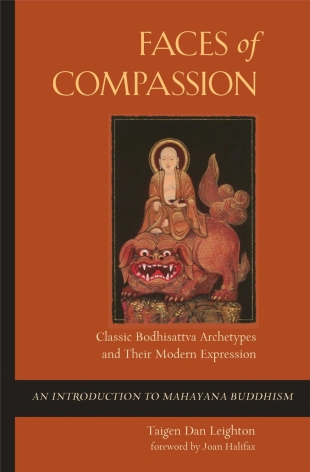
The Heart of the Universe: Exploring the Heart Sutra Paperback – 2 March 2010
by Mu Soeng (Author)
4.8 out of 5 stars 16 ratings
Form is emptiness; emptiness is form.
This is the bold and intriguing assertion of the Heart Sutra, a text of seminal importance to the Buddhist tradition made even more fascinating by its deep resonance with the cutting edges of quantum physics and cognitive science. In spare and approachable language, The Heart of the Universe deftly explores this gem of world religious literature from a variety of perspectives--historical, spiritual, linguistic, and scientific--each serving to interdependently illuminate the other.
150 pages

Heart Sutra: Ancient Buddhist Wisdom in the Light of Quantum Reality
Mu Soeng
4.4 out of 5 stars 8
Paperback
$127.89$127.89
Get it 25 Jul - Aug 4$17.40 shipping
Usually dispatched within 6 to 10 days.

The Other Shore: A New Translation of the Heart Sutra with Commentaries
Thich Nhat Hanh
4.8 out of 5 stars 362
Paperback
$23.76$23.76 RRP: $25.00 (5% off)
FREE Delivery

The Book: On the Taboo Against Knowing Who You Are
Alan Watts
4.7 out of 5 stars 2,376
Paperback
$15.29$15.29 RRP: $17.99 (15% off)
FREE Delivery
Product description
Review
Elegant, simple--and invaluable.--Professor Mark Unno, author of Shingon Refractions
Mu Soeng helps us understand this seminal sutra and its intuitive view of the nature of ultimate reality. He also gives his commentary an ultramodern twist by focusing on the place where quantum physics and Mahayana Buddhism converge.-- "Shambhala Sun"
Mu Soeng's The Heart of the Universe is a brief, thought-provoking commentary on the Heart Sutra. In his introduction, the author, who is the scholar in residence at the Barre Center for Buddhist Studies, reminds the reader that the sutra has a history, and that all who have read--and chanted--it have done so within a specific cultural context. For Soeng, quantum physics--the scientific insight that the basic particles of matter are actually in constant flux-informs how the sutra is understood in the modern West. Of course, any discussion of the Heart Sutra is going to center on the concept of emptiness--the Mahayana theory that all phenomena are without fixed and independent identity. Soeng presents his fascinating discussion of emptiness early in the book, leaving little to say when discussing the famous line 'form is emptiness, emptiness is form' in his line-by-line commentary.-- "Buddhadharma"
Mu Soeng's scientifically inspired commentary opens up the meaning of the Heart Sutra from the side of informed spiritual enquiry and direct meditative experience. Heart of the Universe carries an edge of incisive, practical wisdom.--Ajahn Amaro, abbot of Abhayagiri Monastery
Mu Soeng's treatment of this foundational text is original, clear, helpful, and wise.--Andrew Olendzki
Through his meditative wisdom and scholarly sophistication, Mu Soeng brings to life the profound richness of the Heart Sutra, capturing its transformative meaning for our lives. An in-depth exploration of a vital text.--Joseph Goldstein, author of A Heart Full of Peace and One Dharma
About the Author
Mu Soeng, a former Zen monk and teacher, is the scholar-in-residence at the Barre Center for Buddhist Studies. He is the author of many books on Buddhism, including Trust in Mind and The Diamond Sutra. He lives in Barre, Massachusetts.
Product details
Publisher : Wisdom Publications (2 March 2010)
Language : English
Paperback : 150 pages
Previous page

The Diamond Sutra: Transforming the Way We Perceive the World
Mu Soeng
4.7 out of 5 stars 36
Paperback
$29.03$29.03
Get it 5 - 8 JulFREE Shipping

The Heart Sutra
Red Pine
4.7 out of 5 stars 284
Paperback
$25.03$25.03 $29.99 (16% off)
Get it 5 - 13 JulFREE Shipping

Zen Words For The Heart: Hakuin's Commentary on the Heart Sutra
Norman Waddell
4.4 out of 5 stars 23
Paperback
10 offers from $20.65

The Essence of the Heart Sutra: The Dalai Lama's Heart of Wisdom Teachings
Dalai Lama
4.7 out of 5 stars 122
Paperback
$28.02$28.02
FREE Delivery

The Heart Sutra Explained: Indian and Tibetan Commentaries
Donald S. Lopez
4.5 out of 5 stars 8
NPBM
5.0 out of 5 stars 5 StarsReviewed in the United Kingdom on 25 August 2018
Verified Purchase
Am excellent read, and a good commentary on the Heart Sutra.
Report abuse
Readsalot
5.0 out of 5 stars I've read Mu Soeng's commentaries before. His work is ...Reviewed in the United States on 16 February 2017
Verified Purchase
I've read Mu Soeng's commentaries before. His work is always worth studying. This particular commentary really gave the Heart Sutra imagery that worked for me in a way I had not expected
6 people found this helpfulReport abuse
Tyson Davis
4.0 out of 5 stars Good, rational look at an important SutraReviewed in the United States on 9 December 2013
Verified Purchase
This translation of The Heart Sutra was a very rational look at one of the most important Mahayana Sutras. I read Red Pine's translation and commentaries before this one. They compliment each other very nicely. However I would probably start with this one and then read Red Pine's since his is more dense.
6 people found this helpfulReport abuse
Gregory Coates
5.0 out of 5 stars As Good as IT GetsReviewed in the United States on 26 October 2013
Verified Purchase
Mu Soeng puts himself in the same class as Red Pine (Bill Porter) and the Cleary Brothers with this outstanding work, which is a tremendous work of scholarship mixed with tremendous insight into the Heart Sutra.
6 people found this helpfulReport abuse
D. Apperson
5.0 out of 5 stars Nice commentaryReviewed in the United States on 16 May 2010
Verified Purchase
Nice commentary and breakdown of the Heart Sutra. It does not have the lengthy historical/scholarly commentaries like Red Pine's Heart Sutra commentary, but I enjoyed it very much just the same.
9 people found this helpful



















